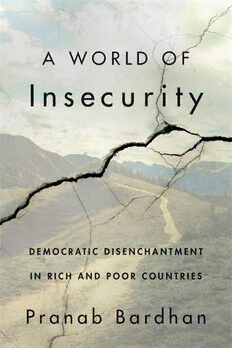
A World of Insecurity: Democratic Disenchantment in Rich and Poor Countries PDF
Preview A World of Insecurity: Democratic Disenchantment in Rich and Poor Countries
A WORLD OF INSECURITY A W O R L D O F I N S E C U R I T Y DEMO CRATIC DISENCHANTMENT IN RICH AND POOR COUNTRIES PR ANAB BARDHAN HARVARD UNIVERSITY PRESS CAMBRIDGE, MAS SA CHU SETTS & LONDON, ENGLAND 2022 Copyright © 2022 by the President and Fellows of Harvard College All rights reserved Printed in the United States of Amer i ca First printing Jacket design: Graciela Galup Jacket art: Westend61, Getty Images 9780674287587 (EPUB) 9780674287570 (PDF) Cataloging-in-Publication Data is available from the Library of Congress. ISBN: 9780674259843 (alk. paper) Contents Introduction 1 1. Insecurity, In equality, and Democracy 12 2. Taking Back Control: Back to the Community? 34 3. The Wildfire of Resurgent Nationalism 48 4. The Temptation of Authoritarianism 62 5. The Slippery Slope of Majoritarianism 92 6. Social Democracy Redux 101 7. Social Democracy and Capitalism: A Restructuring of Their Fraught Link 132 8. In Search of Economic Security: Universal Basic Income 161 9. In Search of Security: Other Policies 176 References 209 Acknowl edgments 219 Index 221 A WORLD OF INSECURITY Introduction In 1938, shortly before his exile from Nazi Germany, the writer Thomas Mann warned an American audience that democracy “should put aside the habit of taking itself for granted, of self- forgetfulness.” In recent years liberals in many democracies have been rudely jolted out of their it- can’t- happen- here complacency. Late on election night, November 8, 2016, Paul Krugman wrote about Donald Trump in the New York Times, “ people like me, and prob ably like most readers of The New York Times, truly didn’t understand the country we live in. We thought that our fellow citizens would not, in the end, vote for a candidate . . . so scary yet ludicrous” (Krugman 2016). About two and half years be- fore that night, many liberals in India felt something similar at Nar- endra Modi’s massive victory— though, one should say, Modi is scary but not ludicrous. The challenge to liberal democracy, occasionally from the Left but mostly from right- wing demagogues, is worldwide. Let us cite some global statistics. In 2021, the V- Dem Institute at the University of Gothenburg, Sweden, produced the largest global data set on democracy, covering about two hundred countries, mea sur ing de- mocracy in disaggregated, multidimensional ways, involving over 1 2 A WORLD OF INSECURITY thirty- five hundred scholars and experts. The institute’s report is grim reading: • Autocracies now rule the majority of p eople—in eighty- seven countries that are home to 68 percent of the global population. • Liberal democracies diminished over the past de cade, from forty- one countries to thirty- two, and now have a population share of only 14 percent. • About one- third of the world’s people— that is, 2.6 billion people— live in nations undergoing “autocratization”; only 4 percent live under regimes that are becoming more demo cratic. • Autocratization has affected major countries like Brazil, India, Poland, Turkey, and the United States. • Latin Amer i ca is back to a level of democracy last recorded in the early 1990s, while Eastern Eu rope and Central Asia are at post– Soviet Union lows. • India, with its population of nearly 1.4 billion, used to be the world’s largest democracy; it is now described as an electoral autocracy due to the severe shrinking of space for the media, civil society, and po liti cal opposition under the current government. • Attacks on freedom of expression and the right to peace- ful assembly and protest, and assaults on the media and academic and other civil society institutions, are inten- sifying across the world; the quality of elections is deteriorating. Other outlets mea sur ing democracy in the world— like the Amer- ican Enterprise Institute, the Economist Intelligence Unit, Freedom House, and the Polity data series— report similar trends.
